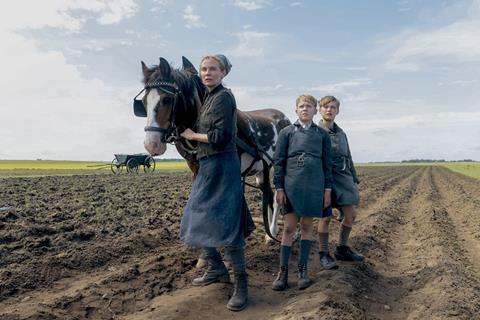Diane Kruger stars in delicate story set on a remote island as the Nazi regime falls

Dir: Fatih Akin. Germany. 2025. 93mins
In his retelling of the Dr Faustus legend, written in 1947 with Germany still reeling from its recent defeat, German novelist Thomas Mann wrote bitterly of what it feels like to live in a “nation that cannot show its face”. Relatively few films have been made about the effect on ordinary Germans of the sudden collapse of a belief system that had been instilled in many of them since birth, perhaps because a much greater trauma – that of the Holocaust – made the shame of defeat itself seem shameful. It’s a theme that somehow needs to be approached at a tangent, not head on. Fatih Akin has found a way in this delicate, rather heartbreaking coming-of-age story set on the German Frisian island of Amrum in 1945.
Something of a departure for Akin
The opening credits read “A Hark Bohm Film By Fatih Akin”. Now well into his eighties, Bohm is a rather cultish, under-the-radar German author, screenwriter and film director whose memories of growing up on Amrum during the war fed into a script he was due to direct. Akin stepped in when Bohm gave up on the idea; the final script was then extensively rewritten by the German-Turkish director of The Edge of Heaven. Premiering at Cannes outside Competition, Amrum should strike a chord with international arthouse audiences, marking a return to form after 2019’s disappointing serial killer drama The Golden Glove and the little-seen-outside Germany Rhinegold (2022). It could reconnect Akin with the audiences who flocked to 2017’s In The Fade, though this evocative period piece is tonally quite different from that flashy contemporary melodrama.
First-time actor Jasper Billerbeck puts in a sensitive performance as Nanning, a pre-adolescent boy who lives with his mother, aunt and siblings on this flat, windswept island in the North Sea. A platoon of RAF fighters flying overhead, the arrival of wagonloads of civilian refuges and a dead airman washed up on the beach are among the few signs that a war’s going on. Otherwise, this rural community goes on doing what it’s always done: growing potatoes, drying and smoking flatfish, living in neat thatched cottages beneath Nazi flags that flap in the wind.
Amrum, we soon learn, is a place apart. It doesn’t quite know if it’s beach, sea or land – these elements merge, forming mudflats where oystercatchers strut and mate, and patches of quicksand lie in wait for the unwary. It’s a place of whalers and seal hunters, one that has seen widespread immigration to the United States (one salty old island returnee is called Sam Gangsters). Amrumers talk a dialect so different from modern German that subtitles will be called for when the film is released in Germany (Diane Kruger learnt Oomrang for her small part in the film as potato farmer Tessa). But at home, Nanning’s family speak ‘proper’ German. He’s trying to work out whether he’s a Hamburger (he was born there) or an Amrumer. What really counts, his heavily pregnant mother Hille (Laura Tonke) tells him, is not where you were born – it’s your bloodline.
How do you help your Nazi mum when, after the death of Hitler, she takes to her bed, lets the new baby cry and refuses to eat anything? Nanning’s answer is to go searching for the three impossible ingredients his mother craves – white bread, butter and honey. And all of a sudden, quite unexpectedly in what was shaping up to be a worthy, conventional period film, we find ourselves watching a quest that might have come straight out of a fairy tale. Nanning’s mission will take him to some pretty dark places – some viewers may nevertheless wince when confronted with a graphic rabbit gutting scene and another in which a seal is shot at close range.
Gradually, Nanning’s quest teases out some of the film’s abiding themes. Where we feel we belong, and the coercive loyalties that can block any change in that status. How, as a child, you go about discovering that those you love are deluded. Shot by veteran DoP Karl Walter Lindenlaub in a crisp, classic style that brings out all the subdued, brackish beauty of this North Sea haven, with a keen eye for figures in the landscape, Amrum is something of a departure for Akin, the kind of precision miniature work that can be achieved on a smaller canvas.
Production company; Bombero international, Warner Bros Film Productions Germany
International sales: Beta Cinema
Producers: Fatih Akin, Herman Weigel
Screenplay: Hark Bohm, Fatih Akin
Cinematography: Karl Walter Lindenlaub
Production design: Seth Turner
Editing: Andrew Bird
Music: Hainbach
Main cast: Jasper Billerbeck, Laura Tonke, Lisa Hagmeister, Kian Koppke, Lars Jessen, Detlev Buck, Jan Georg Schutte, Matthias Schweighofer, Diane Kruger
























